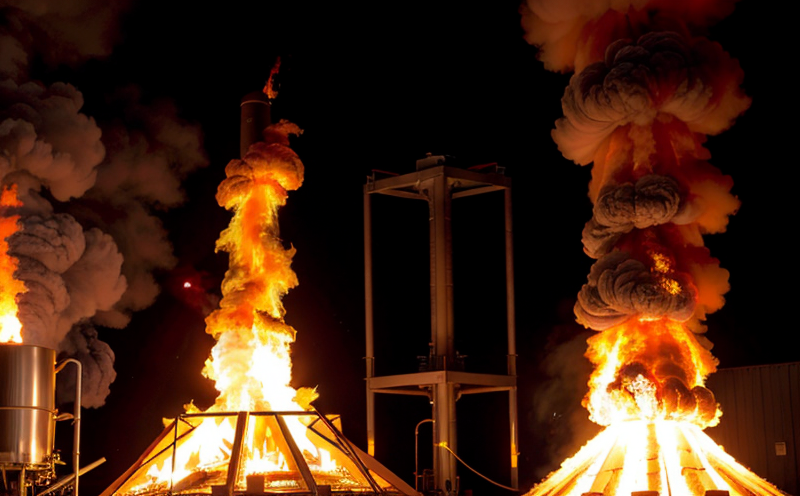Gasoline Flammability Testing
In the realm of chemical safety and quality assurance, gasoline flammability testing is a critical process that ensures compliance with stringent international standards while safeguarding both public health and environmental integrity. This service involves a series of meticulously controlled experiments designed to assess the ignition properties of gasoline samples under specified conditions. The primary goal is to determine the lower flammable limit (LFL) and upper flammable limit (UFL), which are crucial for understanding the safe operating parameters within industrial environments.
The process begins with careful sample preparation, ensuring that each batch adheres strictly to defined specifications regarding purity, temperature, and pressure conditions. The testing apparatus used is highly sophisticated, incorporating specialized equipment calibrated according to ISO standards such as ISO 6751:2019 for the determination of lower flammable limits.
The test setup typically includes a gas chromatograph coupled with a mass spectrometer (GC-MS) for precise analysis. A sample chamber simulates real-world conditions, allowing for accurate measurement of how quickly and easily gasoline can ignite under controlled circumstances. This information is essential for industries handling volatile hydrocarbons like petroleum products.
Once the tests are conducted, detailed reports are generated outlining key findings including LFL values, UFL values, volatility indexes, and any other relevant parameters that affect safety margins. These reports serve as vital documentation for regulatory compliance and internal quality control processes.
A key aspect of this testing involves understanding the broader implications of these results on various sectors. For instance, in automotive manufacturing, knowing precise flammability limits helps design safer fuel systems. In refining operations, it aids in optimizing production efficiency without compromising safety standards.
Moreover, advancements in technology have made gasoline flammability testing more efficient and accurate than ever before. Automated systems can perform rapid analyses, reducing turnaround times significantly compared to manual methods of the past. This not only enhances productivity but also ensures consistent quality across all batches processed.
Benefits
The implementation of gasoline flammability testing offers numerous advantages that extend beyond mere compliance with regulations. By conducting thorough assessments, companies can significantly reduce risks associated with improper handling or storage of volatile fuels. This proactive approach contributes to enhanced workplace safety by minimizing potential hazards in environments where such substances are used.
From an operational standpoint, accurate flammability data enables better resource management and planning. Companies can optimize their supply chains based on precise knowledge about fuel properties, leading to cost savings through reduced waste and improved efficiency. Additionally, this service supports sustainable practices by helping firms identify ways to minimize environmental impact associated with production processes involving gasoline.
For research & development teams, having reliable flammability data is invaluable for innovation. They can experiment confidently knowing that their products will meet stringent safety requirements before reaching market stages. This fosters a culture of continuous improvement within organizations dedicated to excellence in product design and performance.
Competitive Advantage and Market Impact
Adopting gasoline flammability testing as part of your quality assurance strategy can provide significant competitive advantages and drive market success. In today’s highly regulated industry landscape, demonstrating adherence to rigorous safety protocols sets companies apart from competitors who may not prioritize these measures.
Customers increasingly demand transparency regarding product safety and environmental impact. By offering gasoline flammability testing services, businesses signal their commitment to meeting high standards of integrity and reliability. This can enhance brand reputation among consumers seeking trustworthy suppliers.
The ability to provide accurate and timely flammability reports also positions organizations as trusted partners for other stakeholders such as regulatory bodies or third-party auditors. Such relationships strengthen credibility and foster long-term business partnerships based on mutual trust and respect.
Frequently Asked Questions
Use Cases and Application Examples
| Application | Description |
|---|---|
| Automotive Manufacturing | Determining safe fuel system design parameters. |
| Petroleum Refining | Optimizing production processes for efficiency and safety. |
| Aerospace Engineering | Ensuring compliance with rigorous aviation fuel specifications. |
| Construction Materials | Evaluating flammability risks in construction site operations. |
| Hazardous Waste Management | Assessing the safe handling and disposal of used gasoline. |
| Environmental Compliance | Monitoring fuel emissions to meet regulatory requirements. |
| Retail Fuel Distribution | Guaranteeing product quality and safety for end consumers. |





